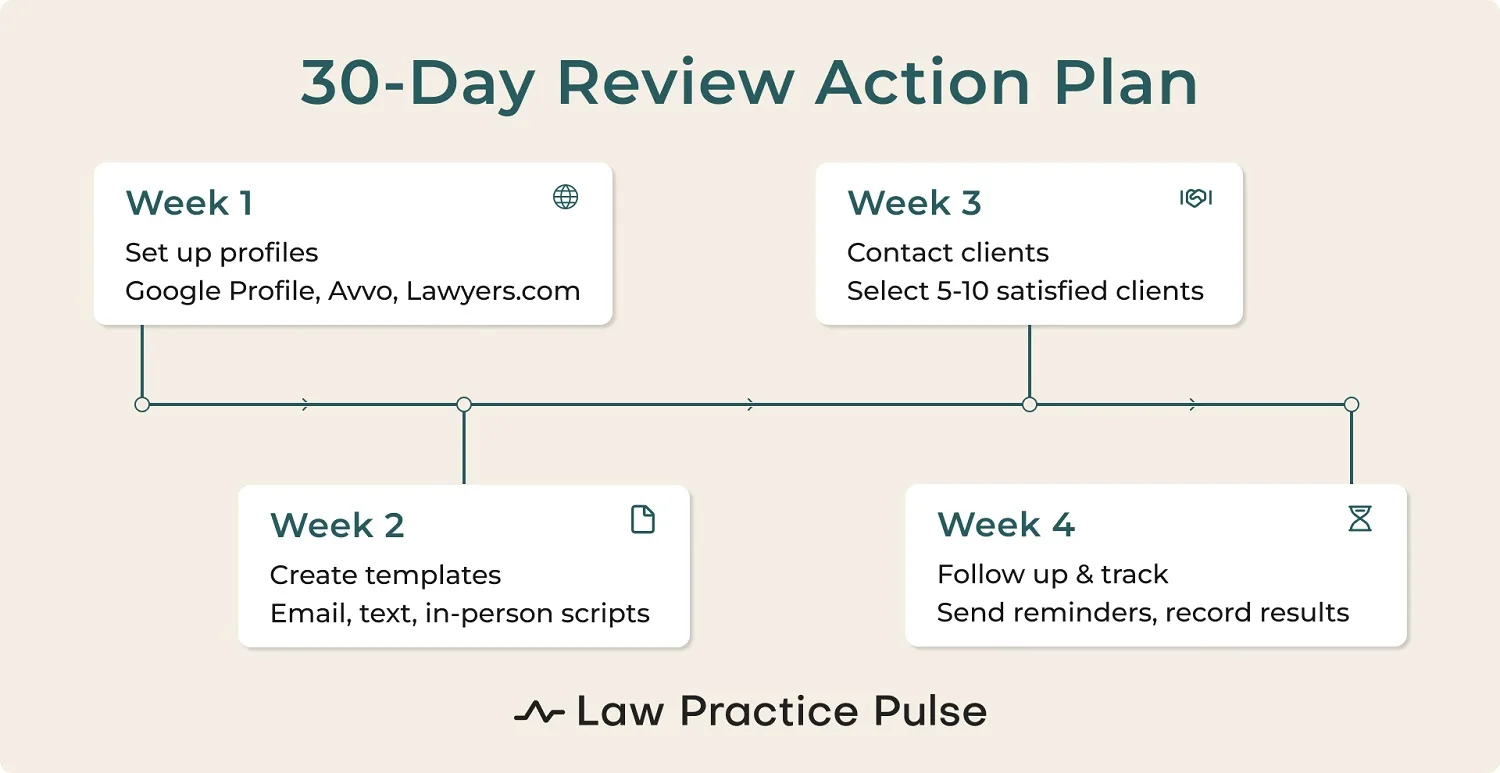As a solo attorney or small firm owner, you already juggle countless responsibilities. Marketing often falls to the bottom of your to-do list, especially when it comes to gathering client reviews. Yet these testimonials are one of the most powerful tools for attracting new clients without breaking your budget.
This guide provides practical, zero-cost solutions you can implement immediately — no marketing staff or expensive software required. By following these straightforward steps, you'll build a collection of positive online reviews that do the selling for you.
Why Client Reviews Matter for Attorneys
Client reviews specifically benefit solo practitioners and small firms by leveling the playing field against larger firms with bigger marketing budgets. When you lack the resources for extensive advertising campaigns, authentic client testimonials become your most valuable marketing asset.
Benefits reviews provide for lawyers:
- Enhanced credibility: Positive feedback from past clients establishes trust with potential clients who research your services online. According to statistics, 49% of consumers say they trust reviews as much as personal recommendations from friends and family members.
- Improved local SEO rankings: Google's algorithm factors review quantity and quality into search results, helping your firm appear higher when potential clients search for legal services in your area.
- Cost-effective marketing: Unlike paid advertising, reviews provide ongoing social proof with no recurring costs, making them ideal for firms with limited marketing budgets.
- Competitive advantage: When satisfied clients share their positive experiences, you stand out among competitors who haven't prioritized collecting testimonials.
- Client acquisition tool: Reviews serve as personal recommendations that convert prospects into clients more effectively than self-promotional content.

Reviews are especially valuable for solo attorneys who need cost-effective ways to establish credibility and visibility in a competitive market. With limited time and resources, you need to focus your efforts where they'll have the greatest impact. Knowing where to direct your review-gathering strategy is the crucial first step.
5 Essential Platforms for Lawyers
Not all review platforms deliver equal value for attorneys. Focusing your efforts on a few key platforms is far more effective than trying to maintain a presence everywhere. Strategic concentration allows you to build strong profiles where potential clients actually look for legal representation.
Google Business Profile
Google Business Profile (GBP), previously GMB (Google My Business), is the cornerstone of local online visibility for attorneys. This free platform directly impacts your search engine optimization and determines how your firm appears in local search results.
To sign up for GBP, you need:
- A Google account connected to your business
- Your complete business address and contact information
- Business hours and services information
- High-quality photos of your office and team
To verify your business, you'll typically receive a postcard with a verification code at your business address. After verification, keep your profile current with fresh photos, updated service information, and prompt responses to questions to maximize visibility.
Reviews on Google are particularly valuable since they appear directly in your GBP profile and search results. Google even allows users to sort reviews by what people mention, making it easier for potential clients to find feedback about specific services or qualities they're looking for.
Avvo
Avvo is a specialized legal directory that rates attorneys and provides a platform for client reviews specifically within the legal industry. Its domain authority helps promote your website and boost your overall online presence through targeted legal search traffic.
More attorneys and agencies are now discussing whether to focus more effort on GBP profiles rather than Avvo, as some users have become more skeptical of the platform's rating system. Nevertheless, Avvo remains influential in certain practice areas and geographic markets.
Setting up an Avvo account is straightforward — you'll need to claim your profile, verify your credentials, and complete your profile information. Maintaining your Avvo presence primarily involves monitoring for new reviews, responding professionally, and occasionally updating your professional information and achievements.
Lawyers.com
Lawyers.com offers significant benefits for attorneys seeking to build their online reputation. The platform's strong domain authority and established trust with legal consumers make it a valuable place to showcase client feedback. To optimize your Lawyers.com profile, include comprehensive service descriptions, professional photos, and prompt responses to inquiries. The platform's review system particularly appeals to potential clients conducting in-depth research on legal representation before making contact.
Yelp
Yelp reviews hold particular relevance for consumer-facing practice areas like family law, estate planning, and personal injury. Attorneys in these fields benefit most from maintaining an active Yelp presence, while B2B-focused practices see less return. To optimize your Yelp profile, include detailed service information, quality photos of your office, and ensure your contact information remains current for potential clients looking to connect.
Today, more lawyers maintain active LinkedIn profiles as an additional credential verification source for potential clients. While LinkedIn doesn't offer a traditional review system, potential clients still check these profiles for authority signals and professional connections. A complete, regularly updated LinkedIn profile with engagement in relevant legal discussions enhances your overall online credibility and complements the reviews on other platforms.

Focusing on these specific platforms rather than diluting your efforts across too many sites delivers better results with less time investment. Quality profiles on fewer platforms consistently outperform low-effort presence everywhere. The good news is that setting up and optimizing these profiles can be completed in approximately 30 days without rushing the process.
When to Ask: Timing Your Review Requests for Maximum Results
Timing is crucial when asking for reviews, and certain moments in the client relationship yield significantly better results than others. Strategic timing increases both response rates and the likelihood of receiving detailed, positive feedback that resonates with potential clients.
Ideal timing suggestions for review requests:
- After case resolution: When you've successfully concluded a matter, clients feel a sense of relief and appreciation that makes them more receptive to providing positive feedback about your services.
- Following positive comments: When a client spontaneously compliments your work or expresses gratitude, follow up with a review request while their positive feelings are still fresh.
- During final meetings: The wrap-up meeting presents a natural opportunity to request a review as part of the case conclusion process, especially when discussing the successful outcome.
- After resolving concerns: If you've addressed a client's concerns effectively, their appreciation for your responsiveness often translates into a willingness to leave positive feedback.
- Milestone achievements: When reaching significant case milestones that benefit the client, their satisfaction creates an optimal moment for review requests.
Challenges When Asking for Reviews
Requesting reviews can present several psychological and practical hurdles for attorneys. Understanding these challenges helps develop effective strategies to overcome them.
Common challenges include:
- Client hesitation about public identification
- Attorney's discomfort with self-promotion
- Unclear instructions leading to abandoned review attempts
- Timing requests when clients are busy or stressed
- Ethical concerns about soliciting feedback
Strategic timing significantly impacts review request success rates. When you approach clients at natural moments of satisfaction or appreciation, you'll achieve better conversion rates than with random or poorly timed requests. Knowing when to ask sets the foundation for how to make your request effective.
How to Ask: Copy-and-Paste Templates That Get Results
Many attorneys feel uncomfortable asking clients for reviews, creating a significant barrier to building their online reputation. Using thoughtfully crafted templates removes this discomfort while ensuring your requests are clear, professional, and effective.
Email Template: After Case Resolution
The email request is often the most effective approach since it gives clients time to consider their response and provides direct links to your review platforms.
- Example 1: "I wanted to thank you for trusting me with your legal matter. Your satisfaction means everything to me. If you have a moment, would you consider sharing your experience by leaving a brief review? It would help other people in similar situations find the guidance they need".
- Example 2: "Now that we've successfully resolved your case, I wanted to express my appreciation for the opportunity to work with you. Would you be willing to share your experience with my services through a quick online review? Your feedback helps potential clients make informed decisions".
- Example 3: "It's been a pleasure working with you on this matter. If you were satisfied with the representation you received, a brief online review would be greatly appreciated. Your feedback helps others who are seeking legal assistance during challenging times".
Text Message Template: Quick Follow-Up
Sending a brief text message can be an effective follow-up method, especially after mentioning reviews during an in-person meeting.
- Example: "Thank you again for your kind words about our work together. If you'd be willing to share your experience as a quick review, it would be tremendously helpful. I can send links to Google, Avvo, or Lawyers.com — which would you prefer?"
This approach acknowledges your previous conversation while offering platform options that make the process more convenient for your client.
In-Person Script: What to Say Face-to-Face
Discussing reviews in person often yields the highest success rate because it establishes a direct connection. The personal approach demonstrates genuine interest in the client's feedback and allows you to address any questions immediately.
- Example: "Before we wrap up, I wanted to mention that my practice grows primarily through word-of-mouth and reviews from satisfied clients like yourself. If you've been pleased with my services, would you consider sharing your experience online? I'd be happy to send you a quick email with the link to make it easy".
These templates save valuable time while maintaining the professional tone your clients expect. Feel free to adjust the language to match your personal style while keeping the key elements that make these requests effective — clarity, simplicity, and authenticity.
Ethical Guidelines: Stay Compliant While Building Your Review Portfolio
Ethical considerations are top-of-mind for attorneys soliciting reviews. Fortunately, maintaining compliance doesn't require navigating complex regulations. This straightforward guidance helps you build your review portfolio while adhering to professional standards — without unnecessary legal jargon.
Ethical review gathering is straightforward when following these basic guidelines. By maintaining client confidentiality, avoiding incentives, and ensuring authenticity, you create a sustainable approach to building your online reputation. This ethical foundation establishes long-term credibility that benefits your practice far more than shortcuts that could potentially create professional complications or undermine trust with clients.
Conclusion
Building a robust collection of client reviews doesn't require complicated systems or expensive software — just consistent, strategic effort. By following Law Practice Pulse guidelines on the right platforms, timing your requests effectively, and using proven templates, you'll steadily build a powerful portfolio of testimonials that attract new clients to your practice.




.webp)